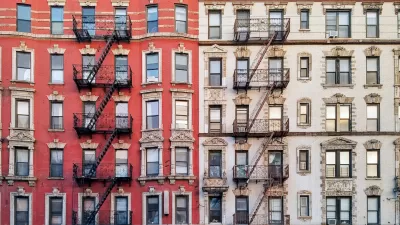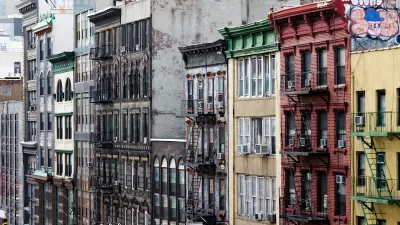Airbnb called the new regulations, which limit rentals to two guests and require owner occupancy, a ‘de facto ban’ for most hosts.

A new law that went into effect in New York City this week, Local Law 18, will eliminate thousands of short-term rental units from the city, reports Amanda Hoover in Wired.
As Hoover explains, the law “is so strict it doesn’t just limit how Airbnb operates in the city—it almost bans it entirely for many guests and hosts. From now on, all short-term rental hosts in New York must register with the city, and only those who live in the place they’re renting—and are present when someone is staying—can qualify.” The law also limits hosts to two guests, eliminating the potential for hosting groups or families.
Critics of short-term rentals say the industry removes badly needed housing units from the long-term rental market and can bring noise, crime, and higher costs to neighborhoods. But the move could also make the city far less accessible to visitors. “Compounding the sudden shortage of Airbnbs in New York is another piece of the new law that allows landlords to ban entire buildings from short-term rental platforms.”
Advocacy group Restore Homeowner Autonomy and Rights is calling on the city to remove the capacity limits for smaller landlords who occupy their homes, arguing that many mom-and-pop hosts don’t fall into the same category as institutional landlords.
More on short-term rentals:
FULL STORY: The End of Airbnb in New York

Trump Administration Could Effectively End Housing Voucher Program
Federal officials are eyeing major cuts to the Section 8 program that helps millions of low-income households pay rent.

Planetizen Federal Action Tracker
A weekly monitor of how Trump’s orders and actions are impacting planners and planning in America.

Ken Jennings Launches Transit Web Series
The Jeopardy champ wants you to ride public transit.

Rebuilding Smarter: How LA County Is Guiding Fire-Ravaged Communities Toward Resilience
Los Angeles County is leading a coordinated effort to help fire-impacted communities rebuild with resilience by providing recovery resources, promoting fire-wise design, and aligning reconstruction with broader sustainability and climate goals.

When Borders Blur: Regional Collaboration in Action
As regional challenges outgrow city boundaries, “When Borders Blur” explores how cross-jurisdictional collaboration can drive smarter, more resilient urban planning, sharing real-world lessons from thriving partnerships across North America.

Philadelphia Is Expanding its Network of Roundabouts
Roundabouts are widely shown to decrease traffic speed, reduce congestion, and improve efficiency.
Urban Design for Planners 1: Software Tools
This six-course series explores essential urban design concepts using open source software and equips planners with the tools they need to participate fully in the urban design process.
Planning for Universal Design
Learn the tools for implementing Universal Design in planning regulations.
Ada County Highway District
Clanton & Associates, Inc.
Jessamine County Fiscal Court
Institute for Housing and Urban Development Studies (IHS)
City of Grandview
Harvard GSD Executive Education
Toledo-Lucas County Plan Commissions
Salt Lake City
NYU Wagner Graduate School of Public Service





























